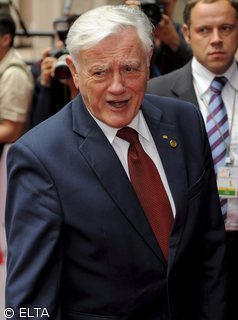The central bank governor is warning that the euro is not the cure for all Poland's ills
Published:
19 January 2005 y., Wednesday
The central bank governor Leszek Balcerowicz is warning that the euro is not the cure for all Poland's ills.
Leszek Balcerowicz believes the government should focus on reforms to yield long-term economic growth, rather than rushing to join the single currency.
"I never said that Poland should enter [the eurozone] at any cost. I said the best strategy is to fulfill conditions for euro entry in a rapid and sustained way," said Balcerowicz, while attending a meeting of central bank governors last week. "The process of EU enlargement was conducive to reforms. The idea of euro entry should be a similar incentive."
Balcerowicz has frequently said that eurozone entry is a political, rather than an economic issue, and that taxes and spending are currently too high for single-currency membership. He also said that tougher reforms were necessary to free Poland from the shackles of long-term high unemployment. In the 1990s, his economic treatments helped Poland recover from the collapse of communism.
"It will pay for Poland to undergo fiscal consolidation," he said. "Unemployment in Poland is not due to over-excessive market-oriented reforms. All of the reasons are structural. There has been some labor market liberalization but I think we need much more decisive action."
Despite his comments, the Civic Platform (PO) party, which is expected to win the next general election, says eurozone entry by 2009 will be a key objective for the party. "Our government will have the strategic goal of adopting the euro by 2008 or 2009. We will do everything to make sure it happens," said Zbigniew Chlebowski, deputy head of the Platform's parliamentary group.
Chlebowski also hinted at the future government's economic policy plans, saying major reform initiatives-such as its flat-tax proposals-would be launched at the start of 2007, not in 2006 as earlier signaled. He also said that limiting the budget deficit in 2006 would be difficult because of the outgoing government's spending promises but that fiscal policy would tighten from 2007.
Šaltinis:
wbj.pl
Copying, publishing, announcing any information from the News.lt portal without written permission of News.lt editorial office is prohibited.
The most popular articles
 Motorola, Inc. today reported sales of $7.5 billion in the third quarter of 2008.
more »
Motorola, Inc. today reported sales of $7.5 billion in the third quarter of 2008.
more »
 The global financial crisis has already battered many European banks. Now it is hitting the EU auto industry, the world’s largest producer of motor vehicles.
more »
The global financial crisis has already battered many European banks. Now it is hitting the EU auto industry, the world’s largest producer of motor vehicles.
more »
 The European Commission has approved, under EC Treaty state aid rules, a German rescue package intended to stabilise financial markets by providing capital and guarantees to eligible financial institutions.
more »
The European Commission has approved, under EC Treaty state aid rules, a German rescue package intended to stabilise financial markets by providing capital and guarantees to eligible financial institutions.
more »
 A new report by the European Commission has assessed the competitiveness of the European Union in the global economy at the end of a decade of rapid economic change.
more »
A new report by the European Commission has assessed the competitiveness of the European Union in the global economy at the end of a decade of rapid economic change.
more »
 Revenue surpasses $15 billion with healthy sales of enterprise software and Xbox 360 consoles.
more »
Revenue surpasses $15 billion with healthy sales of enterprise software and Xbox 360 consoles.
more »
 Airport charges are one of the hidden costs of flying and usually they are passed on from airlines to passengers.
more »
Airport charges are one of the hidden costs of flying and usually they are passed on from airlines to passengers.
more »
 US and European leaders agree to series of summits on world finance.
more »
US and European leaders agree to series of summits on world finance.
more »
 On Monday MEPs will debate a recovery plan for cod stocks in the North Sea and West Scotland. With over 70% of the world’s fish species already fully exploited or depleted, fisheries faces a crisis.
more »
On Monday MEPs will debate a recovery plan for cod stocks in the North Sea and West Scotland. With over 70% of the world’s fish species already fully exploited or depleted, fisheries faces a crisis.
more »
 A new study released by the European Commission today confirms the trend towards more private pension provision in the EU but highlights the need for inclusive coverage and adequate pension levels.
more »
A new study released by the European Commission today confirms the trend towards more private pension provision in the EU but highlights the need for inclusive coverage and adequate pension levels.
more »
 Thursday, October 16, Brussels. President of the Republic of Lithuania Valdas Adamkus attended the second day session of the European Council meeting.
more »
Thursday, October 16, Brussels. President of the Republic of Lithuania Valdas Adamkus attended the second day session of the European Council meeting.
more »